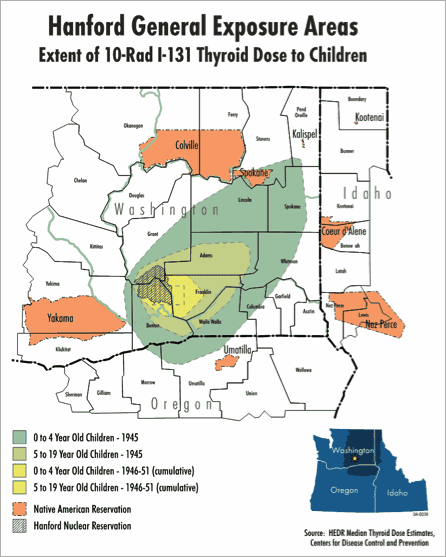Hazardous waste expert witnesses may write reports and testify on hazardous waste sites, the Resource Conservation and Recovery Act (RCRA), and hazardous waste mapping. In the news, whistle-blower Donna Busche was fired from her position as manager of environmental and nuclear safety at the Hanford Nuclear Reservation waste treatment plant construction site. Hanford, located on the Columbia River in the state of Washington, ranks as the most polluted nuclear weapons production site in the US. The Columbia is the fourth largest river in the United States and drains into the Pacific. Hanford was a top secret project in the 1940s with the task of building the atomic bomb. Decades of plutonium production for US nuclear weapons have resulted in cleanup costs estimated at $2B/year. (Below is a Hanford exposure map,)
Ms. Busche worked for URS Corp., which is assisting in building a $12B plant to convert nuclear waste into glass but construction of the plant itself has been stopped due to safety concerns. Busche and others have filed complaints with the federal government over design and safety of the facility.
At http://www.whistleblowers.gov/, the US Department of Labor describes whistleblower protection programs.
OSHA’s Whistleblower Protection Program enforces the whistleblower provisions of more than twenty whistleblower statutes protecting employees who report violations of various workplace safety, airline, commercial motor carrier, consumer product, environmental, financial reform, food safety, health insurance reform, motor vehicle safety, nuclear, pipeline, public transportation agency, railroad, maritime, and securities laws. Rights afforded by these whistleblower acts include, but are not limited to, worker participation in safety and health activities, reporting a work related injury, illness or fatality, or reporting a violation of the statutes.
Protection from discrimination means that an employer cannot retaliate by taking “adverse action” against workers, such as:
• Firing or laying off • Blacklisting • Demoting • Denying overtime or promotion • Disciplining • Denial of benefits • Failure to hire or rehire • Intimidation • Making threats • Reassignment affecting prospects for promotion • Reducing pay or hours Since passage of the OSH Act in 1970, Congress has expanded OSHA’s whistleblower authority to protect workers from discrimination under twenty-one federal laws. Complaints must be reported to OSHA within set timeframes following the discriminatory action, as prescribed by each law.

 Expert Witness Blog
Expert Witness Blog

